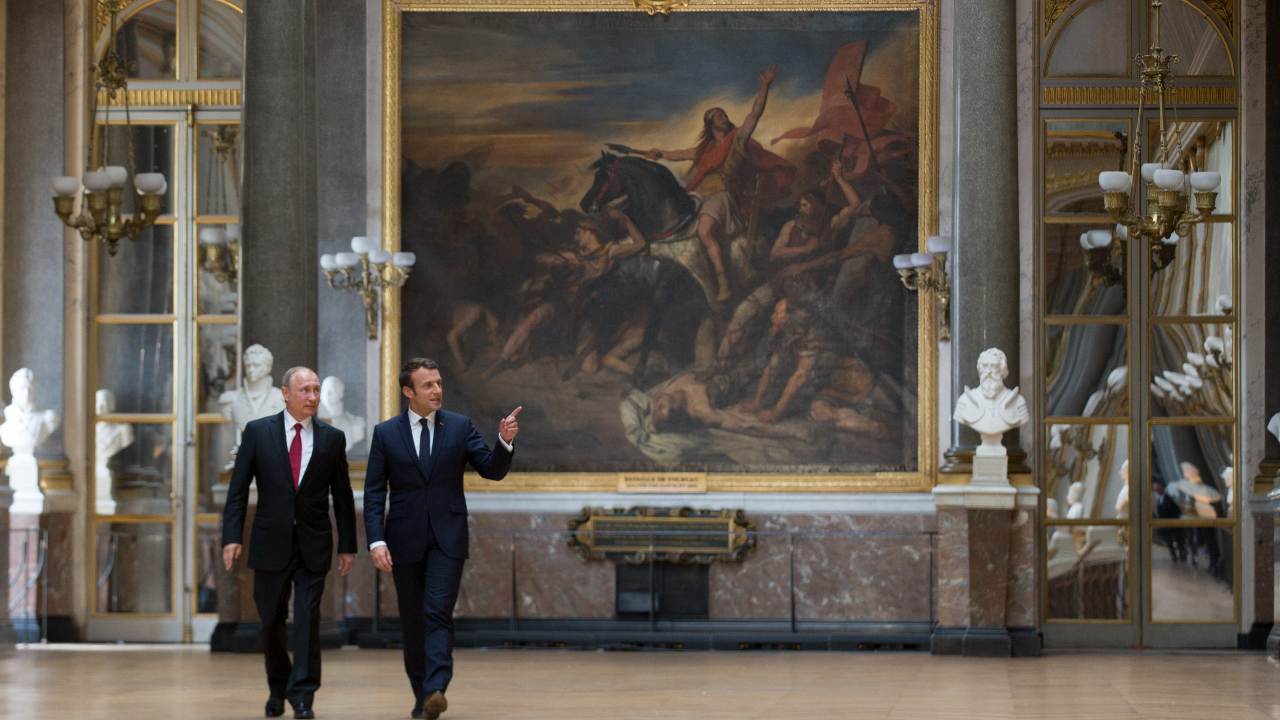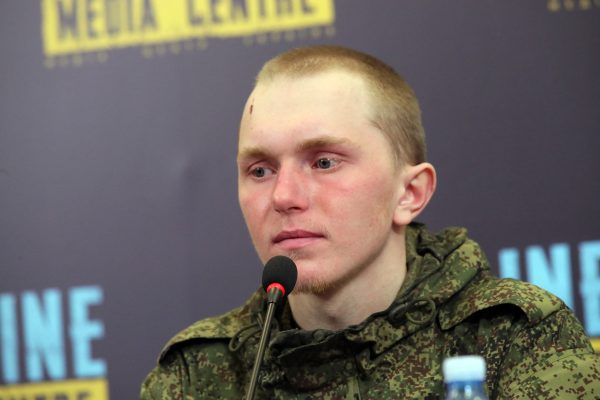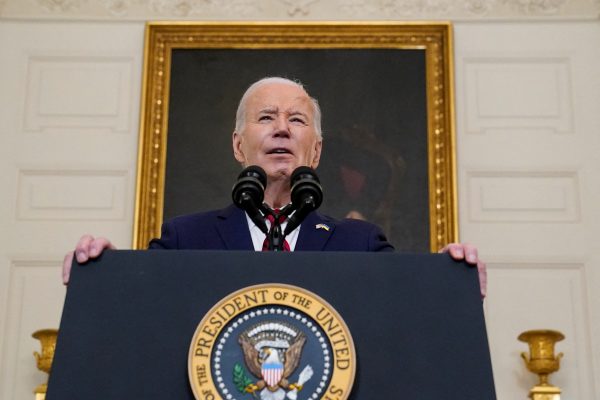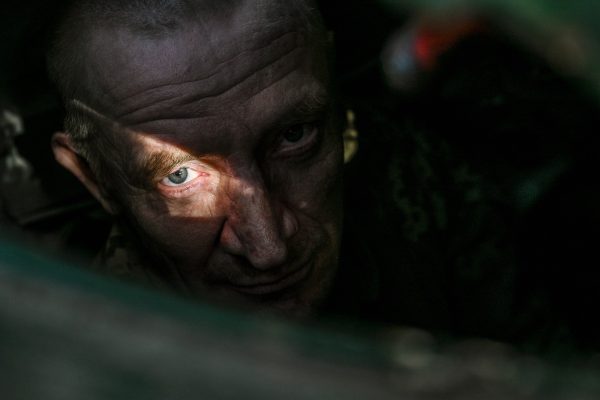During his speech to the European Parliament on January 19, President Emmanuel Macron uttered a sentence that has attracted a great deal of attention among the allies, even though it has been ignored in the public debate in France.
“These next few weeks must lead us to bring to fruition a European proposal that builds a new order of security and stability. We must build it among Europeans, then share it with our allies in the framework of NATO. And then propose it to Russia for negotiation,” he said of the Ukraine crisis.
Yet these words were preceded by other, less noticed, remarks. “What we need to build is a European order based on principles and rules to which we are committed and which we agreed not against or without, but with Russia, 30 years ago: . . . the rejection of the use of force, of threats, of coercion, the free choice for states to participate in organizations, alliances, security arrangements of their choice, the inviolability of borders, the territorial integrity of states, the rejection of spheres of influence. These are the principles that we Europeans, and Russia, signed 30 years ago.”
It is important to give the broader quote, as some news reports offered a truncated view of the French president’s words. His advisors had to try to clear up some misunderstandings, in particular, to make clear that France is not attempting to undercut the US-led discussions with Russia and allied partners. A renowned foreign policy analyst who has not minced his words about Macron’s previous attempts to push dialogue with Russia, argued, in a brilliant paper, that the speech actually marked a shift in the French position toward a harder-line stance on Russia, and the end of the search for an exceptionalist French approach.
So what did Macron mean? Taking the French president’s words literally, it is possible to dispel three accusations.
- First, there is no question of a French approach outside the European Union and NATO (although it is true that his words suggest a specific dialogue between the EU and Russia.)
- Secondly, there is no questioning the freedom of countries to choose their alliances — which applies in particular to Ukraine, Moldova, and Georgia, or even Belarus once it has regained its freedom.
- Finally, Emmanuel Macron underlined the foundations of Europe’s security order as decided after the fall of the Berlin Wall and does not propose to revise it.
That said, his remarks appeared at the least a communication error at a time when all efforts are required to counter the Russian regime’s threats of violence against Ukraine — which was only mentioned in the context of the Normandy Format — and were anyway rather vague. Judging by sometimes strong reactions his words have provoked, it seems clear that some still mistrust the French President.
There are five fundamental reasons for this.
First, the French president has, in the past, shown little willingness to consult his European allies before launching initiatives with the Kremlin. The memory of this has remained vivid. In June last year, for example, a majority of member states opposed the Franco-German project, supported by Austria, for a conference between the European Union (EU) and Russia. It does not appear that he consulted the other NATO member states before making his speech.
Secondly, the very term “new order of security and stability,” which seems to replace the previous formula of “architecture of security and trust” — the term “trust” toward Russia is hardly appropriate — lacks precision, to say the least. No one knows what it may mean: the term “new” has raised concern that the order defined in 1990 following the overthrow of Russia’s puppet regimes in Europe, is being called into question. As for the term “stability”, it seems hardly conceivable given the revisionism of Putin’s regime, unless it leads to the endorsement of spheres of influence (and that has been rejected by all Western states.)
Thirdly, Emmanuel Macron seems to continue to privilege the Franco-German couple, whose relevance for foreign and security policy is more than doubtful, given Germany’s long-standing positions, which tend towards appeasement and a form of quasi-abstention in Russia’s war against Ukraine —having, moreover, lost all legitimacy in Ukraine’s eyes in the Minsk Process. The same mistake was made by President Joe Biden when he apparently chose Germany as the preferred US contact point in Europe following his inauguration last year — hence his complacency towards Nord Stream 2.
Moreover, many feel that Macron’s attitude towards NATO remains ambivalent, despite his welcome commitment to increasing the French military presence, particularly in Romania. His 2019 description of the alliance as “brain dead” was understood not so much as a call for a better definition of the organization’s missions, but as showing weakness towards Russia (which, notably, welcomed his words.)
Some also recall that he sent former Foreign Minister Hubert Védrine, who was considered complacent towards Russia and unenthusiastic about the transatlantic relationship, to represent France in the working group preparing the NATO 2030 document. Nor did he articulate in the solemn speech to the European Parliament on January 19, his vision of the organization and its relationship with the European Security and Defense Policy. His words — “the definition of our own security doctrine, in complementarity with NATO” — much like those on “strategic autonomy,” lacked precision, and have caused confusion.
Finally, the French President, who has not thus far listened to those advising him to make a first trip to Ukraine, did not make his support for the country strong enough, even if it is implicit. The document presenting the priorities of the French presidency of the EU (from January-June) barely mentions this part of Europe, nor Russia itself. If this is not the EU’s priority, what is?
Certainly, President Macron’s remarks can be understood as an attempt to show that Europe counts at a time when Putin intends to marginalize the EU, but they shine little light on France’s Russian policy.
Macron’s suggestion that Europe act as a “balancing power,” as ill-timed as it is ill-considered, seems to imply that Russia, China, and the United States are equidistant and of equal worth (something that he had already dismissed.) Second, while no one is ruling out talks, the word dialogue seems inappropriate today. In fact, despite the multiple working groups launched by the President’s envoy on this subject, Ambassador Pierre Vimont, this dialogue has produced nothing, as was to be expected. Minister of the Armed Forces, Florence Parly, acknowledged as much at the beginning of July 2020.
This is true for Ukraine as well as for Belarus, Syria, and Africa (as in Mali) where Russia’s Wagner militias directly undermine the work done by France. Moreover, while President Macron, a convinced European, intends to strengthen the cohesion and unity of Europe, his attempts at dialogue with Russia have caused division and the alienation of the countries of Central and Eastern Europe, and the Nordic nations. Last but not least, there is no understanding of what he hoped to gain from these multiple initiatives, either bilateral or in a European framework.
It would be unfair to think that Emmanuel Macron would be a sort of Putinversteher (Putin understander) like some German and Italian leaders. Although he sought to lift sanctions on Russia when he was Minister of the Economy in 2016, he has always pleaded as President for their extension. And remember that during his first presidential meeting with Putin in Versailles in 2017, he strongly denounced the Kremlin’s “propaganda outlets,” which had attempted to meddle in his election campaign. Despite sometimes employing overly empathetic body language, he used a firm tone towards his Russian counterpart, including, according to some sources, in their behind close-door conversations. He seems to have understood then that Putin was trying to manipulate him and was lying to him. Now, however, his insistence on dialogue is simply seen as an ambiguity by France’s allies.
Cardinal de Retz, the 17th-century memoirist, stated that “if you set aside ambiguity, it is always to your own detriment.” This sentiment is generally wrong in foreign policy, a fortiori in moments of high tension.
In the coming weeks, France must urgently ensure that ambiguities are removed.
First, Macron should go to Kyiv. This would affirm that support for Ukraine is non-negotiable. Minister of Foreign Affairs, Jean-Yves Le Drian, is expected to visit the front line together with his German counterpart, Annalena Baerbock. This is an excellent sign, but less symbolic than a presidential visit: it would show that France views Ukraine as no less important than Russia in world hierarchies. A clear call for the liberation of the areas of the Donbas de facto occupied by Russian forces would carry weight: de-escalation is not enough. It should be accompanied by the supply of lethal weapons to Ukraine and an affirmation of its European vocation.
Second, during the EU presidency, which coincides with the presidential campaign in France (in April), Emmanuel Macron should work to clarify his vision of the relationship between European defense, whose resources must undoubtedly be increased, and NATO, to counter the suspicion that France is less interested in this organization.
Finally, France must show greater readiness to push for anti-corruption sanctions against Putin’s inner circle, as proposed by the Anti-Corruption Foundation founded by Alexei Navalny and step up its support for civil society and opposition organizations in Russia, as well as in Belarus. It must also respond more firmly to threats to destabilize democracy and justice in France and Europe.
By becoming the European Union state — it is the only permanent member of the United Nations Security Council and the only nuclear-armed power — most resolute in the counter-attack against the Russian threat, France could then disperse suspicion and legitimately acquire genuine leadership.
Nicolas Tenzer, nonresident senior fellow at CEPA, is the editor of Desk Russie, guest professor at Sciences Po Paris, and a blogger on Tenzer Strategics. He is the author of 22 books and three official reports to the French government.
Europe’s Edge is CEPA’s online journal covering critical topics on the foreign policy docket across Europe and North America. All opinions are those of the author and do not necessarily represent the position or views of the institutions they represent or the Center for European Policy Analysis.





